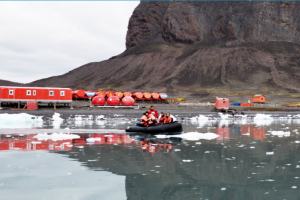. ‘Argentine Antarctica Day’ pays tribute to the inauguration, on 22nd February 1904, of the Meteorological Observatory in Laurie Island, South Orkneys, which would later become ‘Orcadas Base’, a historical milestone that marked the beginning of the uninterrupted activity of Argentina in Antarctica.
However, our sustained presence in Antarctica began earlier, when in 1902 Ensign José María Sobral joined Otto Nordenskjöld's Swedish expedition. The sinking of the expedition’s ship, the ‘Antarctic’, prompted Argentina to carry out a successful rescue, undertaken by the Corvette Uruguay under the command of Lieutenant Julián Irízar.
Over the years, multiple Argentine expeditions that founded the Argentine Antarctic stations stood out. Among others, the air expedition of the Navy to the South Pole, with Pedro Margalot; the expedition by land to the South Pole, with Gustavo Giró Tapper and his commander, General Jorge Leal; and the first transpolar flight, with Mario Luis Olezza and Gustavo Argentino Marambio.
With a vision of the future, Argentina developed a pioneering scientific activity since 1951, with the founding of the Argentine Antarctic Institute (IAA), which fostered the remarkable work of its researchers. It was only in 1959, with the signing of the Antarctic Treaty, that science became the international vector for decision-making within the Antarctic Treaty System.
In those days, there were outstanding scientists such as Dr. Rafael Cordini, author of the first publication of the IAA, glaciologist César Augusto Lisignoli, and researchers such as Ing. Pedro Skvarca, Dr. Marta Ghidella, Dr. Rodolfo Del Valle and Dr. Alejandro Carlini, who continued this tradition of IAA’s quality science.
Our diplomats of the Ministry of Foreign Affairs defended the rights and interests of Argentina in the negotiation of the Antarctic Treaty. They actively participated in the small table of the Washington ‘Conference on Antarctica’, in 1959, where the Treaty was drawn up and approved. Among those ‘Antarctic’ diplomats, Ambassadors Juan Carlos Beltramino, Orlando Rebagliati and Horacio Solari stand out. Today, Argentina maintains an active role in all fora of the Antarctic Treaty, an instrument that duly protects the sovereign rights of Argentina in the ‘white continent’.
In December 2019, we commemorated the 60th anniversary of the signature of the Antarctic Treaty. The Treaty has given rise to other specific rules that today conform the ‘Antarctic Treaty System’. According to it, Antarctica is a continent devoted to peace and science through international cooperation, and has the protection of the environment as one of its pillars.
Argentina is firmly committed to the Antarctic Treaty System and is proud that Buenos Aires is the seat of its Executive Secretariat (www.ats.aq).
Today, with renewed enthusiasm, the members of the Argentine Antarctic Program continue their work, in line with the development of a State policy that began more than 115 years ago. More than a hundred scientists are now carrying out their work in the White Continent on the basis of projects of Argentina’s National Antarctic Program, through IAA. Our Antarctic State Policy also provides that the personnel and means of the Armed Forces are deployed of the Armed Forces -coordinated by the Joint Antarctic Command- to ensure the necessary logistical support. Such policy also enables the consolidation of an active role of Argentine diplomacy in the Antarctic System.


